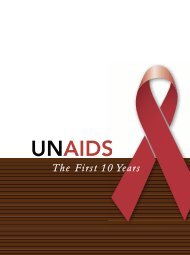Task Shifting - Global Recommendations and Guidelines - unaids
Task Shifting - Global Recommendations and Guidelines - unaids
Task Shifting - Global Recommendations and Guidelines - unaids
Create successful ePaper yourself
Turn your PDF publications into a flip-book with our unique Google optimized e-Paper software.
annex 5<br />
Annex 5<br />
Monitoring <strong>and</strong> Evaluation<br />
In many countries, the implementation of the task shifting approach will involve breaking new ground.<br />
Even in those countries that are already familiar with task shifting, the implementation of the<br />
recommendations <strong>and</strong> guidelines is likely to involve a major scale-up of the approach.<br />
There is already evidence that task shifting can be a rational answer to the health workforce crisis<br />
<strong>and</strong> can directly contribute to scaling up access to basic health-care services, including HIV services.<br />
However, only a careful evaluation of its practical implementation will produce further evidence about:<br />
a) the optimal models for task shifting, which may vary depending on different contexts in different<br />
countries <strong>and</strong> according to the level of decentralization in health-care delivery;<br />
b) the extent to which task shifting is more cost-effective than st<strong>and</strong>ard delivery of care for<br />
delivering efficient <strong>and</strong> equitable health-care services, in particular for HIV/AIDS.<br />
Continuous monitoring <strong>and</strong> evaluation must therefore be established as an integral component of the<br />
implementation process for task shifting at both the country level <strong>and</strong> the global level, <strong>and</strong><br />
operational research should be developed alongside this implementation process.<br />
Monitoring <strong>and</strong> evaluation should be distinguished from each other, although they are closely related.<br />
Monitoring should involve documenting the diffusion of the task shifting approach in the various<br />
countries that adopt it. Pursuing this goal implies that each country monitors the implementation of<br />
the task shifting approach by systematically collecting a minimum package of strategic information.<br />
In the case of HIV/AIDS, this will include documenting the number <strong>and</strong> characteristics of the healthcare<br />
facilities involved, the composition of the health workforce in these facilities <strong>and</strong> some major<br />
indicators of outputs. Such indicators may be, for example, the number of people tested <strong>and</strong><br />
counselled for HIV, the number of people living with HIV/AIDS who are on antiretroviral therapy, <strong>and</strong><br />
number of patients lost to follow-up.<br />
The monitoring process should also include a costing component to answer two important questions<br />
for the budgeting of the task shifting approach <strong>and</strong> the long-term sustainability of financing it. First, to<br />
what extent does task shifting lead to a decrease (or an increase) in the costs of health workforce<br />
labour per unit of outcome? Second, what is its impact on the total unit costs of care (in particular<br />
whether the use of a less expensive labour force for certain tasks is, or is not, “compensated” by an<br />
increase in other components of care, for example laboratory exams for biological monitoring <strong>and</strong><br />
referrals to specialized physicians)?<br />
Evaluation is necessary to assess the effectiveness <strong>and</strong> cost-effectiveness of various degrees of task<br />
shifting in comparison to st<strong>and</strong>ard care for scaling up access to HIV services, <strong>and</strong> eventually other<br />
basic health-care services.<br />
At the global level, indicators will be required that can show the extent to which the task shifting<br />
approach is making a positive impact on efforts to reach agreed targets, such as the Millennium<br />
Development Goals. Therefore it follows that task shifting should not be assessed in isolation but as<br />
an integral part of the evaluation of HIV programmes. Success should be judged on the basis of what<br />
value the approach can be shown to add to overall responses to the HIV epidemic.<br />
In order to achieve this, global HIV programmes should develop indicators to track changes in the<br />
deployment of human resources for health where such indicators do not already exist. <strong>Global</strong><br />
programmes should also endeavour to embed a recognition of task shifting in the indicators that are<br />
currently used to assess global trends <strong>and</strong> influences both on HIV services <strong>and</strong>, more generally, on<br />
basic health care <strong>and</strong> on public health.<br />
78

















